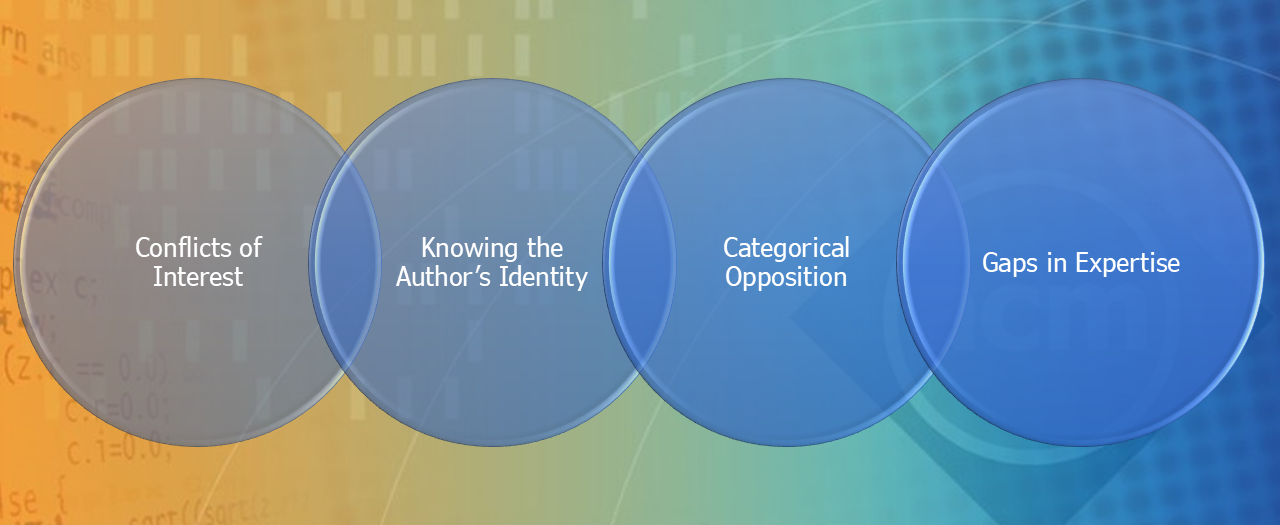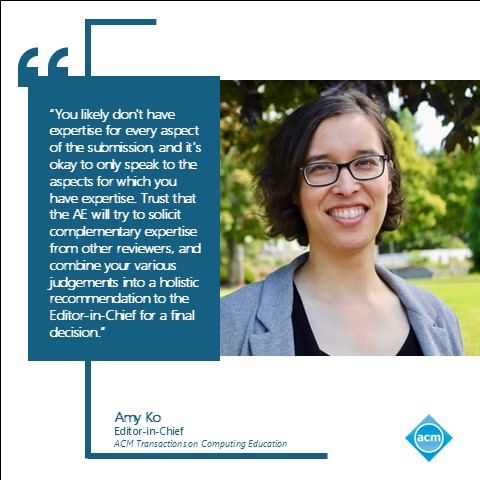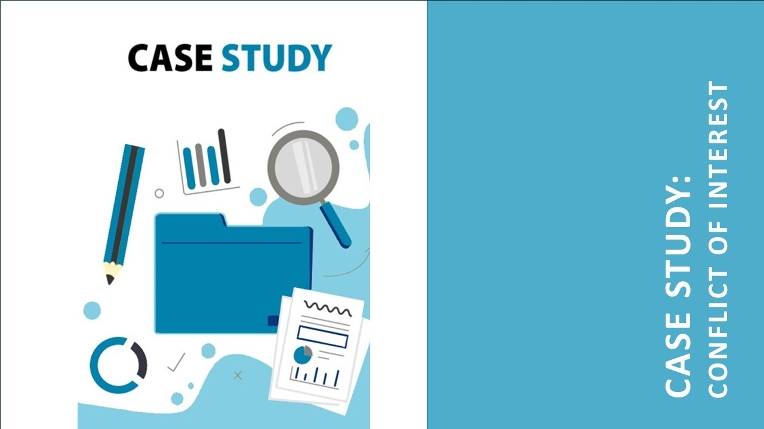Assessing Your Suitability to Review

Conflicts of Interest
A conflict of interest (COI) in peer review occurs when someone's personal, professional, or organizational relationship with the work being reviewed could affect their ability to review it objectively and fairly.
The following are specific exemplars of relationships that produce COIs, as detailed in ACM’s Conflict of Interest policy. Individuals in such relationships should not be involved in peer review of, or making editorial decisions about, work submitted by the related parties.
- Notable personal or professional rivalry/animosity (publicly known or not)
- The lifelong relationship between Ph.D. student and Ph.D. supervisor
- Personal or family relationships that would reasonably cause others to doubt impartiality.
- Potential for financial gain or significant recognition, personally or for a close associate or family member
- Within the last two years or reasonably expected within the next year:
- Working closely together (e.g., at the same institution, company or organization; or within the same organizational team)
- Supervisor/Supervisee relationship exists
- Funder or program manager/awardee relationship exists
- Recipients of joint funding or significant professional collaboration
- Joint authorship of an archival publication (e.g., an item having a DOI)
🔎 Case Study: Conflict of Interest 🔎
Dr. Rodriguez was assigned as a peer reviewer for a manuscript investigating a topic in her field of expertise.
Dr. Rodriguez was unaware that the lead author of the submitted manuscript, Dr. Stevens, had recently joined a research consortium that included Dr. Rodriguez’s longtime colleague, Dr. Carter. Their collaboration was not widely known, as their partnership was still in its early stages and had not been officially disclosed.
As Dr. Rodriguez delved into the manuscript, she noticed a familiarity with some of the research methods outlined in the paper. She decided to investigate further and discovered the new and ongoing collaboration between Dr. Stevens and Dr. Carter. Based on this, she anticipated that she and Dr. Stevens might collaborate in the future and, realizing the potential for bias, she faced a dilemma in maintaining objectivity during the review process.
How should Dr. Rodriguez proceed? Click here to find out.
Knowing the Author's Identity in Double-Anonymous Review
For publications following a double-anonymous peer review model, the following should be kept in mind:
- Knowing the author's identity can be a valid reason to decline an invitation to review, as it can create a COI that may compromise the integrity of the review process.
- In smaller research communities, a reviewer may be able to guess with high probability the identity of anonymized author(s) given that it’s common for peers to know the work being done within their community. However, this does not necessarily indicate a COI. The obligation is that the reviewer should not actively seek to discover the identity of the author(s).
- If the reviewer knows the author personally, has collaborated with them in the past, or has a stake in the outcome of the research, they may not be able to provide an impartial assessment of the manuscript.
- If the reviewer has a concern about a potential COI, they should contact the handling editor of the paper to determine next steps.
Note that in single-anonymous peer review, the reviewers will know the identity of the authors.
|
Conferences vs. Journals: For the conference review process, PC members may provide a list of their conflicts in advance of reviewer assignments, and authors are provided a list of PC members wherein they may select which PC members they are conflicted with. For the journal review process, reviewers are typically assigned a paper based on their expertise, and they must declare a conflict before accepting the assignment. In either conference or journal peer review, if reviewers discover a COI later in the process, they should reach out to the individual that invited them to review to determine next steps. |
Categorical Opposition
Categorical opposition is a common phenomenon in peer review, where reviewers may strongly disagree with elements of a submitted work. This can occur due to differences in opinion, methodology, or interpretation of results.
When a reviewer realizes the research presents premises, methods, or values to which they are opposed, they may not be able to be impartial, and they should escalate their concerns to the handling editor to determine whether to accept the invitation to review.
It is possible that the material presented in the paper is offensive, such as language that is discriminatory, derogatory, or inflammatory. This can undermine the credibility of the research and cause harm to individuals or groups. If the reviewer feels they are unable to review a paper because of offensive material, the invitation should be declined, and the reviewer should flag their concerns to the publication’s editorial office.
Gaps in Expertise
Solid peer review relies on the expertise of the reviewers. Most invitations to review contain the title and abstract of the paper. If a potential reviewer reads these items and determines that there are gaps in their expertise in relation to the overall scope of the manuscript, they should consult with the handling editor to determine whether their perspective may still be useful.
In some cases, the reviewer may not realize until they start reading the paper that the subject is outside their expertise. In this instance, the reviewer should contact the handling editor immediately.
The reviewer should also contact the handling editor when they realize upon finishing their reading of the paper that, although they have expertise in some areas covered by the paper, there are parts for which they do not have the necessary expertise.

Module 2
►Assessing Your Suitability to Review
Conflicts of Interest
CASE STUDY: Conflict of Interest
Knowing the Author's Identity in Double-Anonymous Review
Categorical Opposition
Gaps in Expertise
Module 3: Review Touchstones
Module 4: Evaluating the Paper
Module 5: Submitting Your Review
Module 6: Artifact Review and Badging
ACM Peer Reviewer Certification Exam
****
COMPLETE
✓ Module 1: Peer Review Overview
Case Study: Conflict of Interest
Dr. Rodriguez was assigned as a peer reviewer for a manuscript investigating a topic in her field of expertise.
Dr. Rodriguez was unaware that the lead author of the submitted manuscript, Dr. Stevens, had recently joined a research consortium that included Dr. Rodriguez’s longtime colleague, Dr. Carter. Their collaboration was not widely known, as their partnership was still in its early stages and had not been officially disclosed.
As Dr. Rodriguez delved into the manuscript, she noticed a familiarity with some of the research methods outlined in the paper. She decided to investigate further and discovered the new and ongoing collaboration between Dr. Stevens and Dr. Carter. Based on this, she anticipated that she and Dr. Stevens might collaborate in the future and, realizing the potential for bias, she faced a dilemma in maintaining objectivity during the review process.
How should Dr. Rodriguez proceed. Click here to find out.
